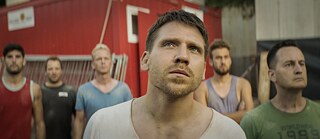From the Black Forest to Hong Kong: Perspektive Deutsches Kino, the section for debut films, looks beyond the horizon to take in the great wide world.
By Philipp Bühler
It may well be the most candid look at the human rights protests in Hong Kong: from her hotel window, Anke gazes down at the throngs below and hears their shouts only as distant murmurs, for her thoughts are elsewhere. The pensioner has flown all the way from the Black Forest to this embattled metropolis to see her son. But he hasn’t showed his face and might well have very different problems of his own. Anke gets to talking with the locals and gradually comes to feel a spiritual connection to the place. And she comes to see her yearning as the expression of a greater human desire. This is, at any rate, one way of viewing Jonas Bak's debut film Wood and Water, in which the director cast his mother in the leading role. He is the absent son who causes his mother so much pain, but succeeds in capturing that pain in poignant atmospheric images with the aid of some remarkable camera work.
Across borders
Closeness and distance in a globalized world are one theme of the “Perspektive Deutsches Kino” section at this year's Berlinale, which once again asks: How do you define German film? In
When a Farm Goes Aflame, Jide Tom Akinleminu documents a gripping Danish-Nigerian love story, the story of his parents. The filmmaker grew up in both countries, but did his training in filmmaking in Germany. So did Yana Ugrekhelidze, who, in the documentary
Instructions for Survival, explores the plight of trans people in her native Georgia.
No salvation
Mia Maariel Meyer's feature film
Die Saat (
The Seed) is a very German film about a very global problem called capitalism. Whilst working on a building site, an ambitious tiler with a precarious family life has to give up on his hopes of a promotion. With his usual dogged tenacity, the renowned actor Hanno Koffler works his way through a Ken Loach plot, at the end of which everything lies in ruins. Only
Jesus Egon Christus, a feature film about a drug rehab clinic run by evangelicals, is even more moving. It owes its heavily documentary feel to the use of an authentic amateur cast who move in no less clearly stylized milieus – you can tell that the directors, brothers David and Saša Vajda, studied philosophy. Paul Arámbula, who is obviously troubled himself, turns in a fabulous performance as Egon, a psychotic misfit with a messianic complex. Was he just the wrong patient for an otherwise viable solution? This is a gripping, challenging film about spiritual anguish, religion as a substitute drug and the unappeasable yearning for salvation.
